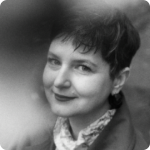Past Events

- Global Hub

- Karolina Koziura, Mariia Shynkarenko, Amanda Zadorian, Jessica Pisano
- Zoom
Emerging Scholars on the State of the Field, Activism, and Advocacy is the third panel in the Decolonization in Focus Series. The Russian war in Ukraine has had innumerable impacts, from personal to political, local, national, and global. One of the many sea changes wrought by the war has been the reckoning within Slavic/Russian & Eurasian Studies over the outsized role Russia has played and continues to play in the field and what could and should be done about it. The invited panelists in this series will consider the relationships of power that have long dominated the region, how they have impacted the field of study, and what, if anything, could and should be done about it. The series will consist of six wide-ranging panels featuring speakers from a variety of disciplines and institutions. Panelists and participants will be encouraged to consider why decolonizing Russian & Eurasian studies matters, how to implement concrete change in their classrooms, and how to conceive of the future of expertise within the field. All sessions will be convened using Zoom, live-streamed via YouTube, and recorded to be made available for later viewing.

- Various
Russia, Eastern Europe, and Central Asia are often conceptualized as a single geopolitical unit. The 21st century has challenged these conceptions due to breakthroughs in technology and medicine, new regional conflicts, and the continuing effects of globalization. These transformations have molded individuals, nations, cultures, languages, and disciplines, provoking questions of identity. For our platinum conference GOSECA invites presentations exploring identity today.

- Ana Bakić
- White Whale Bookstore

- William Pitt Union Assembly Room
Take a break from studying and enjoy free drinks and snacks from around the world! Instructors and students from the Less-Commonly-Taught Languages Center (LCTL) and Pitt's many language departments will teach you how to order in Swahili, German, Modern & Ancient Greek, Quechua, Hebrew, Irish, Chinese, Persian, Turkish, Arabic, Ukrainian, English, and many more of the nearly 30 languages offered at Pitt. Then, you can place your order at the Language Coffeehouse and enjoy free drinks and snacks from around the world.

- Kaija E. Schilde
- Zoom
Kaija E. Schilde
Jean Monnet Chair of European Security
Associate Professor, Pardee School of Global Studies
Director, Center for the Study of Europe
Project on the Political Economy of Security
Pardee School Initiative on Forced Migration and Human Trafficking
The EU is a non-unitary security state of international significance and is threat responsive to challenges to its interests. It has become a security state through a combination of incremental institutional layering and shifts in international threat, primarily the 2014 Russian annexation of Crimea and intervention in Eastern Ukraine, and the 2022 Russian invasion of Ukraine. The security studies debate on European strategic autonomy has so far ignored and dismissed the infrastructural power of the EU. The EU’s infrastructural power comes from regulatory, monetary and market instruments, and a nascent but increasing direct procurement of military materiel. EU infrastructural power complicates EU-related state formation theory debates. Traditional security states extract resources from their society, directly tax their populations, and have formal authority to generate military capability. Historically, the EU has done none of these things. Scholars using the conventional lens of state security authority have concluded that the EU is not yet a security state, because it does not tax and spend to generate military capacity on its own (Kelemen & McNamara, 2022). However, this misdiagnoses the sources of infrastructural security power in the 21st century, and only compares the political development of the EU to the generation of military power in earlier centuries. Moreover, this position fails to consider the comparative: how do contemporary non-EU states generate military capacity? To what are we comparing EU state formation? I theorize a broader definition of security state to align with 21st Century generation of military power and evaluates the shifts in EU infrastructural power in light of changes.
Prior Title: EU Defense Cooperation and the War in Ukraine

- Oleksandra Kuedel
- 4217 Posvar
What explains the resilience of local authorities in Ukraine after Russia’s invasion? Using original survey data, this talk explores how local authorities continue to provide public services and respond to crises because of Russian attacks on civilian infrastructure and massive internal displacement. The findings highlight a shifting social contract in Ukraine towards partnership between authorities and citizens as the foundation for democracy. Oleksandra Keudel is an Assistant Professor at the Department of Public Policy and Governance at the Kyiv School of Economic and is a Petrach Ukrainian Studies Fellow at the Institute for European, Russian and Eurasian Studies at George Washington University. Her book “How Patronal Networks Shape Opportunities for Local Citizen Participation in a Hybrid Regime: A Comparative Analysis of Five Cities in Ukraine” was published with ibidem/Columbia University Press. Keudel’s research focuses on local democracy, social movements and civic engagement, and business-political arrangements at the local level in Ukraine.

- Katarzyna Gorak-Sosnowska, Botakoz Kassymbekova, Iryna Sklokina, Vitaly Chernetsky
- Zoom
Discourse and Decolonization: Perspectives from Outside the Anglophone Academy is the second panel of the Decolonization in Focus Series. The Russian war in Ukraine has had innumerable impacts, from the personal to the political, local, national and global. One of the many sea changes wrought by the war has been the reckoning within Slavic/Russian & Eurasian Studies over the outsized role Russia has played and continues to play in the field and what could and should be done about it. The invited panelists in this series will consider the relationships of power that have long dominated the region, how they have impacted the field of study, and what, if anything, could and should be done about it. The series has six wide-ranging panels featuring speakers from various disciplines and institutions. Panelists and participants will be encouraged to consider why decolonizing Russian & Eurasian studies matters, how to implement concrete change in their classrooms, and how to conceive of the future of expertise within the field. All sessions will be convened using Zoom, live-streamed via YouTube, and recorded to be made available for later viewing.

- Various
- Croghan-Schenley Room
The revolutionary prospect of socialism inspired homosexual emancipation and the growth of toleration toward same-sex relations in the first quarter of the twentieth century in many countries, including the UK, US, Hungary, and USSR. However, the development of LGBTQ+ rights within socialism was never linear and even. The conference seeks to address those discrepancies and the reasoning behind them. It aims to discuss the LGBTQ+ experience and its political, social, and cultural implications under state socialism from a global perspective. What was the place of queerness under socialism? Was socialist ideology generally more responsive to queer people’s agenda and empathic towards them? How did legislation relate to same-sex activity change over time in socialist countries? How did the Cold War and geopolitical tensions between socialist and capitalist counties influence and inform sexual politics toward queer people and their perception? Why did some socialist countries, such as the Czech Republic, Hungary, and the GDR decriminalize homosexuality as early as the 1960s and the Polish People’s Republic never criminalize it? What strategies of networking and concealment did sexual and gender non-conformists adopt in the socialist countries where homosexuality was still illegal, such as Soviet Republics, China, and Cuba? What was the attitude towards gender and sexual dissidents among the left-leaning movements in capitalist countries? Why decriminalization of homosexuality and homosexual emancipation that followed it was subsequently cut off in some post-socialist countries such as Russia? The main goal of the symposium is to reflect on the broad spectrum of topics related to the conjunction of queer and socialist ideology from a global and comparative perspective. The symposium aims at the broader public, including students, scholars, and activists.

- Dr. Volodymyr Dubovyk
- 4130 Posvar
The start of Russia's war in Ukraine in 2014 has impacted regional security in the Black Sea through the occupation of Crimea. The massive invasion of 2022 has led to even more profound implications. Yet, Russia has failed to convert the control of Ukrainian territories into lasting strategic advantages. The recent liberation of Kherson and fear in Moscow that Ukraine might go into Crimea indicate a shift in the situation. The talk will shed light on the humanitarian impact of war, the disruption of global trade, and the larger security implication for the Black Sea region and Europe, more broadly.
Volodymyr Dubovyk is Associate Professor at the Department of International Studies, Odesa I. I. Mechnikov National University in Ukraine. He has conducted research at the Kennan Institute, Woodrow Wilson International Center for Scholars (1997, 2006-2007) and the Center for International and Security Studies at the University of Maryland (2002), taught at the University of Washington in Seattle in 2013 as well as at St. Edwards University and the University of Texas in 2016-17. He is the co-author of Ukraine and European Security (Macmillan, 1999) and has published numerous articles on US-Ukraine relations, regional and international security, and Ukraine's foreign policy.

- Dr. Volodymyr Dubovyk
- 4130 Posvar
The start of Russia's war in Ukraine in 2014 has impacted regional security in the Black Sea through the occupation of Crimea. The massive invasion of 2022 has led to even more profound implications. Yet, Russia has failed to convert the control of Ukrainian territories into lasting strategic advantages. The recent liberation of Kherson and fear in Moscow that Ukraine might go into Crimea indicate a shift in the situation. The talk will shed light on the humanitarian impact of war, the disruption of global trade, and the larger security implication for the Black Sea region and Europe, more broadly. Volodymyr Dubovyk is Associate Professor at the Department of International Studies, Odesa I. I. Mechnikov National University in Ukraine. He has conducted research at the Kennan Institute, Woodrow Wilson International Center for Scholars (1997, 2006-2007) and the Center for International and Security Studies at the University of Maryland (2002), taught at the University of Washington in Seattle in 2013 as well as at St. Edwards University and the University of Texas in 2016-17. He is the co-author of Ukraine and European Security (Macmillan, 1999) and has published numerous articles on US-Ukraine relations, regional and international security, and Ukraine's foreign policy.

- Ambassador Norman Eisen
- Teplitz Memorial Moot Courtroom
Ambassador (ret.) Norman Eisen is a senior fellow in Governance Studies at the Brookings
Institution and a CNN Legal Analyst. At Brookings, he chairs the institution’s signature anticorruption
program, Leveraging Transparency to Reduce Corruption, and is the founder and
lead editor of the Brookings Russia Sanctions Tracker. He represents Brookings as the civil
society co-chair of the Financial Transparency and Integrity cohort for the Biden
administration’s second Summit for Democracy and co-chairs the Transatlantic Democracy
Working Group. Eisen is the co-author of the Democracy Playbook, which situates anticorruption
in the broader pro-democracy framework. Eisen frequently publishes on topics
relating to Ukraine and its reconstruction.

- Maria Lotsmanova
- 4130 Posvar Hall
Maria Lotsmanova, former head of the document center of the GULAG History Museum, will present two short screenings: a four minute documentary on the Gulag History Museum and an eleven minute documentary short on her family history (with subtitles).
Maria Lotsmanova has until recently worked at Moscow’s Museum of Soviet Repressions (the GULAG History Museum, 2021 Winner of the Council of Europe Museum Prize), where she would run the Document Center that consults with visitors and gives regular seminars on how to find information in archives about people who were persecuted and convicted during the mass repression in the USSR. She would conduct research for museum exhibitions, publishing projects, museum storage practices and represent the Center at external venues. Her other professional interests include documentary filmmaking and photography, green activism, and sustainability projects. In 2022 Maria moved to Pittsburgh where she currently works as a gallery associate at the Carnegie Museum of Art.

- Epp Annus, Svitlana Biedarieva, Marina Mogilner, Tamar Shirinian
- Zoom
The Russian war in Ukraine has had innumerable impacts, from personal to political, local, national, and global. One of the many sea changes wrought by the war has been the reckoning within Slavic/Russian & Eurasian Studies over the outsized role Russia has played and continues to play in the field and what could and should be done about it. In its third year, the In Focus series will focus on decolonizing Russian and Eurasian studies. The invited panelists will consider the relationships of power that have long dominated the region, how they have impacted the field of study, and what, if anything, could and should be done about it. The series will have six wide-ranging panels featuring speakers from various disciplines and institutions. Panelists and participants will be encouraged to consider why decolonizing Russian & Eurasian studies matters, how to implement concrete change in their classrooms, and how to conceive of the future of expertise within the field. All sessions will be convened using Zoom, live-streamed via YouTube, and recorded for later viewing.
- ‹ previous
- 28 of 46
- next ›

